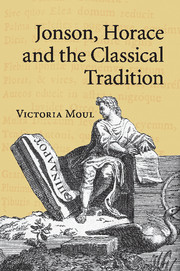Book contents
- Frontmatter
- Contents
- Acknowledgements
- List of abbreviations
- Introduction: imitation, allusion, translation: reading Jonson's Horace
- 1 Jonson's Odes: Horatian lyric presence and the dialogue with Pindar
- 2 Horatian libertas in Jonson's epigrams and epistles
- 3 Competing voices in Jonson's verse satire: Horace and Juvenal
- 4 Poetaster: classical translation and cultural authority
- 5 Translating Horace, translating Jonson
- Conclusion: More remov'd mysteries: Jonson's textual ‘occasions’
- Appendix: manuscript transcriptions
- Bibliography
- Index of passages discussed
- General index
3 - Competing voices in Jonson's verse satire: Horace and Juvenal
Published online by Cambridge University Press: 05 October 2010
- Frontmatter
- Contents
- Acknowledgements
- List of abbreviations
- Introduction: imitation, allusion, translation: reading Jonson's Horace
- 1 Jonson's Odes: Horatian lyric presence and the dialogue with Pindar
- 2 Horatian libertas in Jonson's epigrams and epistles
- 3 Competing voices in Jonson's verse satire: Horace and Juvenal
- 4 Poetaster: classical translation and cultural authority
- 5 Translating Horace, translating Jonson
- Conclusion: More remov'd mysteries: Jonson's textual ‘occasions’
- Appendix: manuscript transcriptions
- Bibliography
- Index of passages discussed
- General index
Summary
Chapters 1 and 2 have been concerned primarily with poetic praise, albeit often praise of a rather didactic or self-aggrandising kind. But both the Epigrams, with their alternating patterns of commendation and reproof, and the verse epistles, most of which are marked by extended satiric passages, demonstrate Jonson's abiding interest in the poet's power to blame as well as to praise. Horace, too, is a poet both of praise (in the Odes and Epistles) and of blame (in the Satires and Epodes); and Horace's satire acts for Jonson as a foil and an answer to the artistic and ethical problems raised by Juvenalian anger. In this chapter I want to trace the development of this satiric texture in the course of Jonson's work, beginning with its roots in the carefully positioned classicism of the ‘comical satires’.
JONSONIAN SATIRE: PROBLEMS AND DEFINITIONS
As with verse epistles, there are generic problems raised by any discussion of ‘satire’. In the critical literature, a distinction is often made between the modern sense of satire as a ‘mode’ of writing, applicable across genres, and a more clearly defined generic ‘identity’ for satire in the Elizabethan period. This generic ‘identity’ should not, however, be overstated. The generic affiliations of many individual poems are still the subject of debate, despite several attempts to itemise what constitutes an Elizabethan satire.
- Type
- Chapter
- Information
- Jonson, Horace and the Classical Tradition , pp. 94 - 134Publisher: Cambridge University PressPrint publication year: 2010



